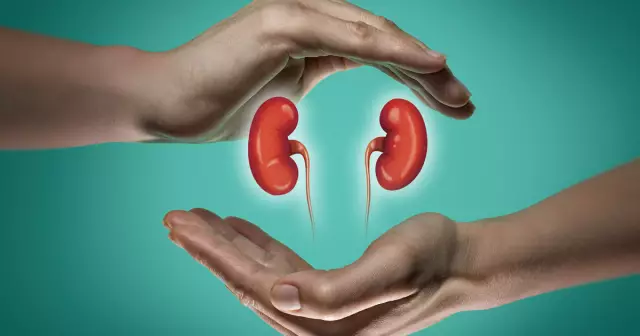- Author Rachel Wainwright wainwright@abchealthonline.com.
- Public 2023-12-15 07:39.
- Last modified 2025-11-02 20:14.
10 signs of kidney dysfunction
The importance of the kidneys to the body can hardly be overestimated. These organs not only do the work of cleaning the blood from decay products and removing excess fluid. They are also responsible for the production of some hormones necessary to maintain the normal state of bone tissue, as well as for the production of red blood cells - erythrocytes. With kidney damage, the electrolyte, water-salt and acid-base balance are disturbed, toxic substances accumulate in the body. Renal failure can be acute or chronic. In the second case, the disease is especially dangerous because its initial symptoms are easily confused with signs of other diseases. According to statistics, 9 out of every 10 patients are unaware of its presence in the early stages of the development of the disease. To avoid trouble, it is important to knowhow impaired kidney function at first affects the human condition.
Prostration
The accumulation of toxic decay products in the blood primarily negatively affects the central nervous system. Patients complain of constant fatigue, lethargy, memory loss and difficulty concentrating.

Source: depositphotos.com
Sleep disturbances
Kidney pathologies cause nocturnal insomnia combined with daytime sleepiness. In addition, sleep apnea is common in these patients.

Source: depositphotos.com
Deteriorating skin condition
The elasticity of the skin is closely related to the water-salt balance. With kidney failure, excess water accumulates in the body, and the concentration of trace elements and nutrients decreases. The skin immediately reacts to this: it becomes pale and dry. Patients suffer from constant itching.

Source: depositphotos.com
Changes in the nature of urination
Depending on the cause and stage of development of the disease, various symptoms can be observed: frequent urination, false urge, increased or decreased urine output. Sometimes there are cases of involuntary or painful urination. Patients complain of aching, dull pain in the lumbar region.

Source: depositphotos.com
The presence of blood in the urine
Normally, the kidneys filter out only excess fluid and decay products from the blood. If the kidney filters (nephrons) malfunction, blood cells begin to enter the urine. Most often these are erythrocytes (then urine acquires a characteristic reddish tint), but sometimes leukocytes are also found.

Source: depositphotos.com
Foamy urine
In a healthy person, protein can be detected in urine only in trace amounts. With renal failure, a large amount of albumin (the protein that makes up the bulk of a chicken egg) passes from the blood into the urine. At the time of urination, the formation of bubbles and even a fairly persistent foam is observed.

Source: depositphotos.com
Swelling of the legs and upper side of the feet
With kidney dysfunction, not only water is poorly excreted from the body, but also some trace elements (for example, sodium). If the water-salt metabolism fails, fluid accumulates in the legs - they swell.

Source: depositphotos.com
Muscle cramps
Many patients with kidney failure complain that their legs are cramped. These are cramps in the calf muscles due to an imbalance of sodium and potassium in the body. The "culprit" of this situation is often renal failure.

Source: depositphotos.com
Persistent swelling around the eyes
In this case, the change in appearance is associated not only with fluid retention, but also with the process of washing out protein from the body.

Source: depositphotos.com
Decreased appetite
The decrease in interest in food is due to general intoxication caused by the accumulation of decay products. In parallel, phenomena such as nausea, vomiting, dyspepsia can be observed. With the progression of the disease, symptoms of anemia and vascular tone disorders occur.

Source: depositphotos.com
In acute renal failure, the state of health deteriorates so quickly that a person almost immediately falls into the hands of doctors and receives qualified assistance. If the disease is chronic, the destruction of the renal tissue (parenchyma) can be almost asymptomatic for a long time. In order not to start the disease, you need to listen very carefully to the signals that the body gives. In the presence of at least a few of the described symptoms, it is necessary to urgently consult a doctor and undergo the examination recommended by him.
YouTube video related to the article:

Maria Kulkes Medical journalist About the author
Education: First Moscow State Medical University named after I. M. Sechenov, specialty "General Medicine".
Found a mistake in the text? Select it and press Ctrl + Enter.






